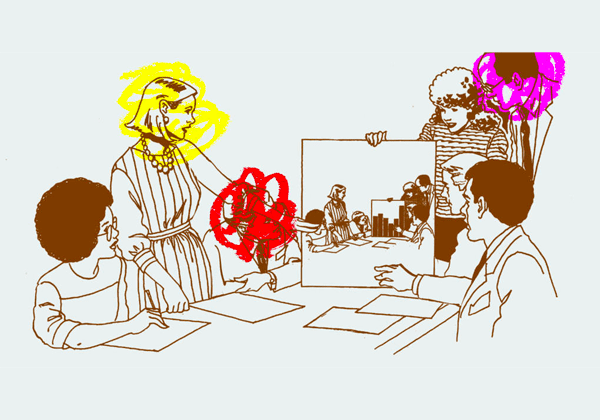Scanning an advert on USyd’s CareerHub or the vacancy of a corporate firm or startup, one repeats a gamut of overly familiar procedures – filing a resume, cover letter, seeking references and at times, encountering a personality test. Be it Myers-Briggs, HEXACO, or DiSC (dominance, influence, steadiness, and conscientiousness), these tests increasingly act as substitutes for horoscopes and astrology for the office. Whilst reliance on these tests may provide harmless humour, they might just be less useful than expected and at worst, discriminates against the disadvantaged.
Having emerged since the advent of the Myers-Briggs Type Indicator (MBTI), which is based on Carl Jung’s psychological theory, personality testing today represents an industry worth approximately $500 million in the United States alone. According to Merve Emre’s The Personality Brokers: The strange history of Myers-Briggs and the Birth of Personality Testing, the metric evolved from Katharine and Isabel Briggs’ obsessions with Jung’s psychological orientation theory (whilst wholly lacking in any formal psychological or psychiatric training). With an estimated 90% of Fortune 100 companies, including Atlassian, using the MBTI either in hiring or teambuilding, psychometric personality testing is in vogue.
Earlier in the year, during a professional training session, I sat down alongside my team to undergo Gallup’s CliftonStrengths (yes, the same Gallup that conducts opinion polls) test. Presenting a nearly exhaustive and timed round of about 100 questions, the test produces a report designed to surgically disseminate our capabilities – as the firm claims – across four domains: executing, influencing, relationship building, and strategic thinking.
Upon receiving our results, many were awestruck, starting a chain reaction whereby reports were circulated between each other and ultimately, presented to our head manager. Prior to this, we were relegated to piecemeal information about one another; now, it seemed that we have a scientific profile of the entire cohort at our disposal. Six months on, some of us hold that report almost as a dogmatic statement of our working personality.
Gallup claims that this test is used by more than 26 million users. Clearly, the corporate world is enamored with the tests’ seeming ability to streamline costs associated with longer, primarily interview-based recruitment blueprints.
Yet I remain convinced otherwise.
The first flaw of psychometric personality testing is their tendency towards binary categories as opposed to a holistic assessment involving genuine conversations. Many personality tests rely upon computerised algorithms in order to process and predict a profile for applicants. Applicants fill out a timed/untimed online questionnaire, match or select preferred images which artificial intelligence then compile together to generate a tailored profile for hiring managers’ viewing. Regardless of how algorithm developers spin their product, the outcome is a standardised profile that may ironically end up narrowing rather than diversifying the personality range of applicants because they are typically used as a preliminary filter to determine suitability for interviewing. Thus, a process that heavily weigh human-conducted review (ie. managers actively reading through applications) to determine interview potential, despite our unconscious biases, remain crucial in assessing talent than allowing an algorithm to influence first impressions of applicants.
Others condemn tests like the MBTI as pseudoscience. Indeed, the MBTI Foundation itself warns against utilising the test as a hiring metric.
“Organizations that wrongly use the MBTI assessment for hiring decisions are confusing preference with skill and are doing themselves a disservice in their hiring process,” the Foundation says. “It is unethical, and in many cases, illegal, to require job applicants to take the Indicator if the result will be used to screen out applicants.”
Another potentially major flaw of personality testing is its ability to discriminate against disabilities. The Disability Discrimination Act 1992 (or the DDA) has express prohibitions on hiring procedures that discrimination on the grounds of disability. The most pertinent area of concern with regards to increasingly complex psychometric testing is the rich potential for indirect disability discrimination to occur.
For example, some such as HireVue employ live video review technologies whereby applicants’ facial expression and eye contact, among other nonverbal cues, are assessed for organisational fit. Yet technologies like this fail to accommodate for communication preferences of a variety of disabilities. Autistic applicants, for instance, may not display the same set of nonverbal traits associated with enthusiasm or sales charisma even though the same person may be an exceptional fit for the job. As a consequence, before any interview, that candidate may be unfairly screened out by an ableist algorithm.
All of this before one even considers the nuances of intersecting marginalised or minority identities including culture, socio-economic background among other characteristics.
According to a report by the Washington-based Center for Democracy & Technology, algorithms employed in psychometric personality testing tools can reinforce ableist presuppositions, resulting in disadvantages particularly to people with visual or psychosocial disabilities.
“Because algorithms learn by identifying patterns and replicating them, algorithm-driven tools can reinforce existing inequalities in our society,” the report explained. “Algorithmic bias can also be harder to detect than human bias, because many people think of technology as ‘neutral.’”
The remedy to accommodate much of these shortcomings lie in the classic face-to-face or where needed, live video interview, a written sample or an oral test. Although more expensive and at unease with the capitalist instinct towards hyper-efficiency, the conversations exchanged during an interview would benefit everyone beyond refraining from disability discrimination. Nonverbal or written information, unfiltered by an impersonal machine, offers better insight into a person because they are the foundation of a good future working relationship. No artificial intelligence filter, after all, will replace real-life conflict management or tactful negotiation necessary in just about any career.
The determination of highly contested and subjective characteristics like emotional stability, impulsivity, introversion/extroversion among others should be conducted through tried-and-tested interviews rather than a simple psychometric personality test. To persist would risk slipping through highly qualified individuals and at worst, perpetuating ableist and socio-economic inequalities that plague an already strained capitalism.





